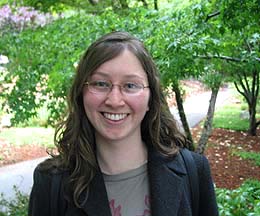|
June 28, 2004
Profs line up to ask undergrad to help with their
research
By Jennifer McNulty
As a campus, UCSC is known for fostering undergraduate research opportunities,
but even at UCSC, it’s pretty unusual for a student to be recruited
for three different projects.
|

One of Alexis Spencer's research projects was to compile a database
of child care providers in Santa Cruz. Photo
by Jennifer McNulty
|
Welcome to Alexis Spencer’s senior year.
Spencer, 22, who graduated in June with honors in psychology, got to
work closely this year with professors on research projects in cognitive
and social psychology. She turned down a professor’s invitation
to work on a developmental psych project because there weren’t
enough hours in the day. The opportunities rounded out Spencer’s
course work and gave her invaluable exposure to lab experiments and
fieldwork.
“I’ve been interested in psychology since the beginning of
high school,” said Spencer, a Cowell College student who earned
college honors and graduated Phi Beta Kappa. “I’ve always
been interested in how the mind works.”
Margaret (Meg) Wilson, an assistant professor of psychology, invited
Spencer to participate on a project last winter investigating gestures
and memory.
“Meg knew I wanted to go into clinical psychology, maybe counseling,
but she kept encouraging me to do research because she thought I’d
be really good at it,” said Spencer. The project helped Spencer
learn how to design and implement experiments and analyze data.
But Spencer took the greatest satisfaction from an independent advanced
research project she undertook with social psychology professor Faye
Crosby to compile a database of local child care providers.
The two-quarter project involved a lot of information gathering, and
Spencer said she approached the task “like a parent.”
“I couldn’t believe they’re not all listed somewhere,”
she said of child care facilities. “You can’t just open the
phone book and see what’s available.”
Although Spencer identified about 50 child care facilities in Santa
Cruz, few had any openings, and many had long waiting lists. The plan
is to make the database available to the community on a university web
site. Spencer presented her findings to the Faculty Welfare Committee
of the Academic Senate, but her satisfaction was diminished by the paltry
number of openings compared to the scope of need. Crosby and other advocates
for a new university-run child care facility plan to use Spencer’s
findings to raise funds for the project.
In compiling the directory of child care resources, Spencer learned
a lot about survey research and enjoyed the “crossover” between
academic research and public service. “The database is such an
important thing to have that I was happy to do it,” she said.
Spencer derived similar satisfaction from a freshman-year internship
with the California Public Interest Research Group, during which she
coordinated the group’s Hunger and Homelessness Project. And she
volunteered at a local stroke rehabilitation center as a service-learning
project for her Intergroup Relations class this past spring.
At first, she said, she felt like she was “cheating” because
she was convinced she was getting more out of the experience at the
rehab center than she was giving.
“They’ve taught me so many life lessons by sharing what they’ve
learned through their experiences of being totally capable one moment
and then being unable to walk--or talk or write or see--the next,”
she said. “A couple of weeks ago, I realized I actually am being
helpful. People have said they wish I could stay. They feel like I help.”
Spencer’s varied experiences have helped her think about her plans
for graduate school. “I think I’ve ruled out developmental
psychology, but I don’t know if I want to do social, clinical,
or cognitive,” she said.
Faculty have shaped Spencer’s college years from the start, and
she credits literature and language instructor Gildas Hamel with opening
her eyes to new perspectives. Spencer took Hamel’s Biblical Narratives
class during her sophomore year and regularly attended office hours
to talk with him. “It was great fun for me,” said Spencer.
“He’s extrememly intelligent and knowledgeable, and he has
the ability to integrate lots of information and make connections I
wouldn’t think of.”
Spencer, who spent her junior year in New Zealand with the Education
Abroad Program, said the availability of UCSC professors “blows
me away,” and she laments the fact that many undergraduates don’t
take advantage of faculty office hours.
Studying abroad heightened Spencer’s appreciation for cultural
differences. “New Zealand is very different from the United States.
It’s remote, small, and not very powerful,” she said. “People
think they can’t make a difference. They’re humble. Here,
we think we’re the center of the world and all-powerful. Because
they saw me as representing America, I wanted to be sure what I did
reflected well on all Americans.”
Reflecting on what drew her to UCSC four years ago, Spencer said the
campus has lived up to her hopes. “I liked the philosophy of the
campus and the focus on learning as a process,” she said. “There
are so many opportunities here, it’s hard to take advantage of
them all. It’s going to be sad to leave.”
Return to Front Page
|